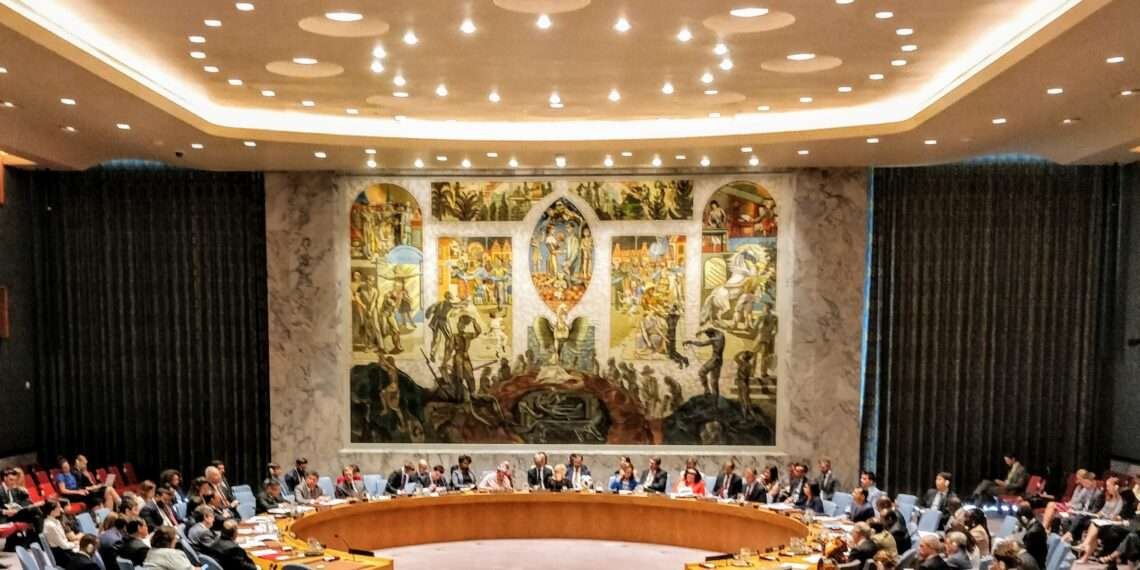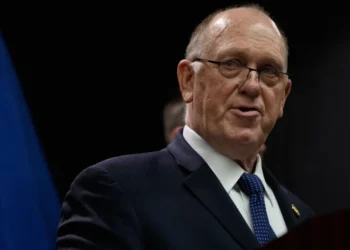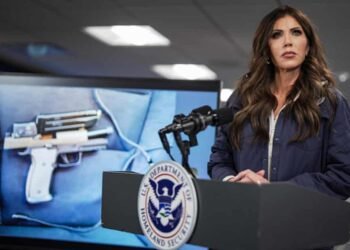The United States has vetoed a crucial United Nations Security Council resolution demanding a ceasefire in Gaza.
It came as Israel expanded its ground offensive on Gaza City.
It was the sixth time the US had cast a veto in the Security Council over the nearly two-year war between Israel and Hamas militants.
The resolution, approved by 14 of the 15 members of the council, called for an “immediate, unconditional and permanent ceasefire in Gaza respected by all parties,” the release of all captives held by Hamas and other groups, and a lifting of restrictions on humanitarian aid into Gaza.
Drafted by the council’s 10 elected members, the resolution went further than previous iterations to highlight what diplomats called the “catastrophic” humanitarian situation in Gaza after nearly two years of war in the Gaza Strip, which has killed at least 65,141 people, according to Palestinian health officials.
Denmark’s UN Ambassador, Christina Markus Lassen told the council before the vote, “Famine has been confirmed in Gaza – not projected, not declared, confirmed.”
“Meanwhile, Israel has expanded its military operation in Gaza City, further deepening the suffering of civilians. As a result, it is this catastrophic situation, this humanitarian and human failure, that has compelled us to act today.”
Christina Markus Lassen
Nonetheless, the United States vetoed the effort. Morgan Ortagus, US Deputy Special Envoy to the Middle East, said, “US opposition to this resolution will come as no surprise.”

“It fails to condemn Hamas or recognise Israel’s right to defend itself, and it wrongly legitimises the false narratives benefitting Hamas, which have sadly found currency in this council.”
Morgan Ortagus
Ortagus added that the UN-backed Integrated Food Security Phase Classification’s official declaration of famine in the enclave last month had employed “flawed methodology”, hailing the work of the heavily militarised Gaza Humanitarian Foundation (GHF) hubs, where so many Palestinians have been killed while seeking food for their families.
Ortagus told the council before the vote that Hamas is “responsible for starting and continuing this war.”
“Israel has accepted proposed terms that would end the war, but Hamas continues to reject them. This war could end today if Hamas freed the hostages and laid down its arms.”
Morgan Ortagus
The United States traditionally shields its ally Israel at the United Nations. But in a rare move last week, it backed a Security Council statement condemning recent strikes on Qatar, though the text it did not mention Israel was responsible.
The move reflected US President Donald Trump’s displeasure with the attack ordered by Israeli Prime Minister Benjamin Netanyahu.
However, the US veto showed that just a week later Washington was again staunchly giving diplomatic protection to Israel.
US Veto “Deeply Regrettable”
After the vote, the Palestinian Ambassador to the United Nations, Riyad Mansour stated that the US veto was “deeply regrettable” and had prevented “the Security Council from playing its rightful role in the face of these atrocities and to protect civilians in the face of genocide.”
“Unfortunately, the Council remains silent at a great cost for its credibility and authority. This demonstrates that when it comes to atrocity crimes, the use of the veto should simply not be allowed.”
Riyad Mansour
Algerian Ambassador to the UN, Amar Bendjama also expressed regret, saying, “Palestinian brothers, Palestinian sisters, forgive us.”
“Forgive us, because the world speaks of rights, but denies them to Palestinians. Forgive us because our efforts, our sincere efforts, shattered against this wall of rejection.”
Amar Bendjama
The war in Gaza had, he noted, killed more than 18,000 children and 12,000 women, killed more than 1,400 doctors and nurses, and more than 250 journalists. Israel, he added, was “immune,” not because of international law, but because of the “bias of the international system.”
Meanwhile, the Israeli Ambassador to the United Nations, Danny Danon, said that Israel needed “no justification” for its war on Gaza. He thanked Ortagus for exercising the US veto.
READ ALSO: Former Chief Justice’s Legal Future Sparks Heated Debate























